The Pew Research Center advises readers to interpret generational labels “as general reference points instead of scientific facts.”
(5 things to keep in mind when you hear about Gen Z, Millennials, Boomers and other generations)
Other writers and organizations have noted differences within generations and proposed subdivisions, such as Generation Jones (born between 1954 and 1965).
Recognizing the limitations of this approach and its unoriginality, I will nevertheless propose yet another such subdivision based upon a peculiar American cultural moment: the Bicentennials.
Bicentennials are people who were aged 6-12 in 1976, the 200th anniversary of the signing of the Declaration of Independence, and thus were exposed to the celebration of that bicentennial during elementary school, as well as the bicentennial of the ratification of the Constitution (1987) in their late teens or early adulthood. I still have a copy of the Constitution in pamphlet form that I got in 1987.
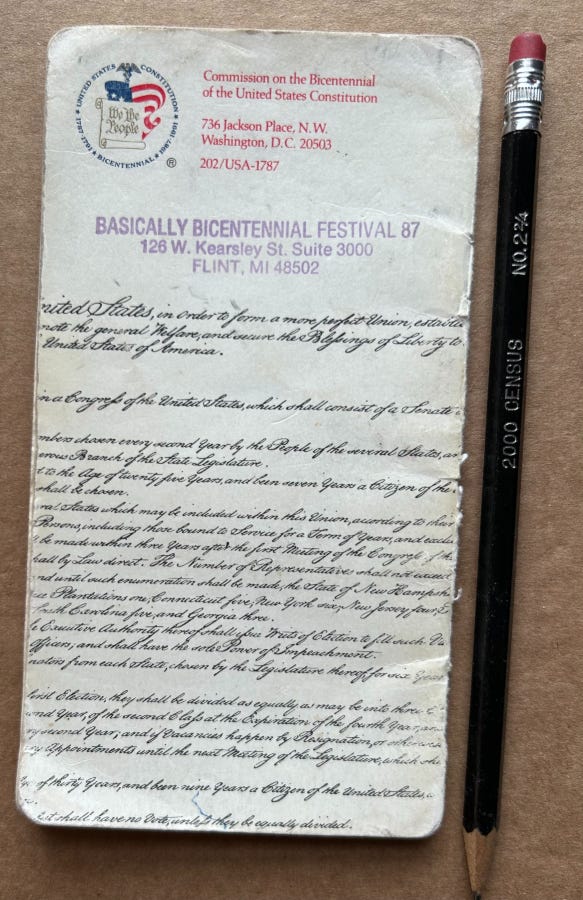
I was 10 years old in 1976, an impressionable age. Among other things, I remember the “Bicentennial Minutes” and Schoolhouse Rock episodes about American history and government on TV, reading illustrated children’s books about the American Revolution, and an art project I did with a classmate in 2nd grade depicting a battle from that war.
We had to recite the pledge of allegiance, at least in the early grades. But we were not inculcated with blind loyalty to the U.S. government. Our teachers tried to give us an understanding of how our form of self-government was supposed to work, and why the fact that it existed at all was significant, and to some extent these messages were reinforced by the wider culture. So even though many of our parents were disillusioned by the events of the ‘60s and ‘70s and participated in the counterculture, many Bicentennials reached adulthood with some degree of patriotism and a basic understanding of concepts like the separation of powers, checks and balances, federalism, and the rights and responsibilities of citizens. I learned the words “petition” and “constituent” from a story in a schoolbook about a kid who went door-to-door gathering signatures for some cause.
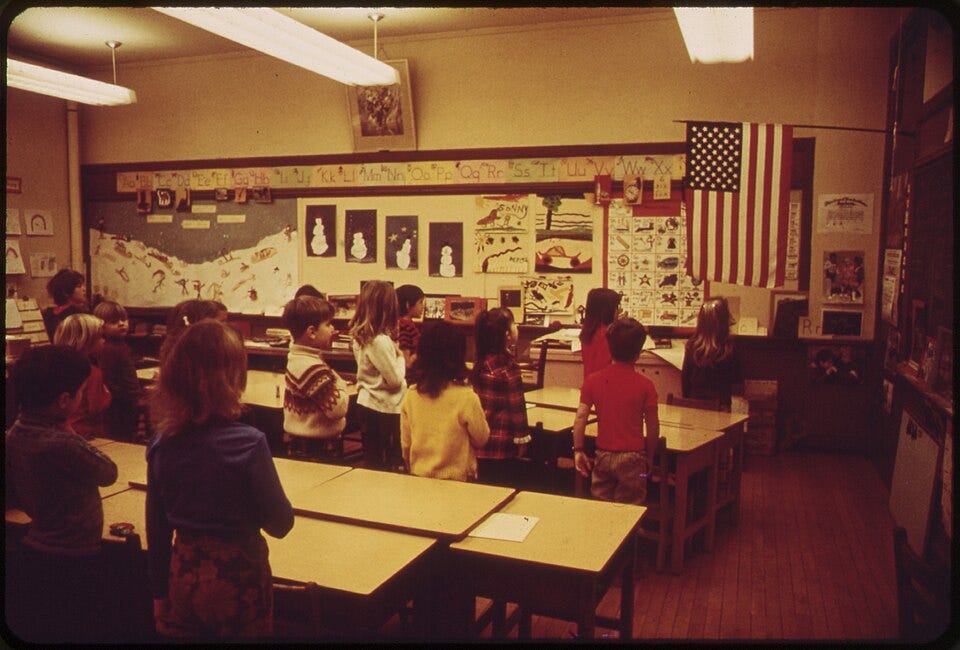
That’s why I find the current state of politics so demoralizing. I can’t understand how people could have so little regard for or understanding of our institutions that a plurality (not a majority — cold comfort, but I’ll take it) would vote for someone who tried to violently overthrow a legitimate election and is now actively attempting to dismantle those institutions. It seems to indicate a massive failure of civic education.
Is civics no longer taught? I recall a conversation I had with a fellow in a bar some time in the mid 2010s, I think. He complained that Americans don’t know even the basics of how the government works. Thinking of my own education, I thought surely they knew at least the basics. Seeking support for my position, I turned to a young woman sitting nearby and asked her if she could name the three branches of government. She had no idea; she could not name even one.
The 2024 election was also a failure of civic solidarity. Anybody over 40 is old enough to remember the 2008 foreclosure crisis and the recession and high unemployment that went with it. Anybody who lived through that should understand that keeping people employed and in their homes is more important than keeping prices low, even if they don’t know the basic economic relationship between employment and inflation. But in 2024 many swing voters apparently gave themselves all the credit for keeping their jobs and homes and blamed the incumbent administration for rising prices.
In 2016 and to a lesser extent in 2020, I could say of Trump voters, “they know not what they do”. After January 6, 2021, there was no such excuse; if there was ignorance, it was willful and culpable. “Stop the steal” was an obvious lie; if people still believed it in 2024, it was not simply because of the complicity of certain media organizations and influencers who disseminated that lie, it was because they wanted to believe it. Not to mention those who had no illusions about “stop the steal” but voted for Trump anyway: the oligarchs, accelerationists, and other opponents of government by, for, and of the people.
But now half a century has passed since the bicentennial and we have come upon another milestone year. 2026 will mark the 250th anniversary of the signing of the Declaration of Independence. Commemorations have already begun: April 18th, 2025, is the 250th anniversary of the “shot heard round the world” — the battles of Lexington and Concord, which historians consider the start of the American Revolution. (Here are posts from historians Heather Cox Williamson and Lindsay M. Chervinsky on this occasion.)
I had been dejected at the thought that we would have an insurrectionist and would-be tyrant in the Oval Office during this period of commemoration. But Thomas Jefferson invoked Providence in the Declaration1, and maybe it is Providential that the current administration’s authoritarian assault on our Constitution and our liberties should coincide with that commemoration. Maybe some of the young people witnessing reenactments of those battles this weekend (WBUR story ; NBC10 video) will catch some of that “Spirit of ‘76”, as I did back fifty years ago. And not just young people. Protests are taking place again today (19 April). I’ve attended three previous protests this year, and it seems to me that over time the crowds have gotten larger and the rhetoric has shifted, with more emphasis on defending democracy and the Constitution and less emphasis on narrower progressive talking points.
And who knows? A lot can happen between today and 4 July 2026. Maybe that would-be tyrant won’t preside over the 250th anniversary of the signing of the Declaration after all. But by the same token, the Republic might not make it past 249 if its citizens and elected officials do not uphold the Constitution and the rule of law.
I will turn 60 in 2026 (God willing). Over the coming year, I hope to occasionally reflect on how my experiences have shaped my views. This is the first such post.
The last sentence of the Declaration of Independence:
And for the support of this Declaration, with a firm reliance on the protection of divine Providence, we mutually pledge to each other our Lives, our Fortunes and our sacred Honor.

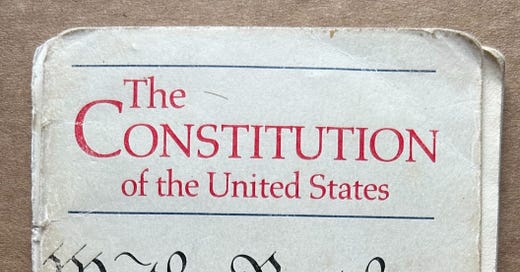


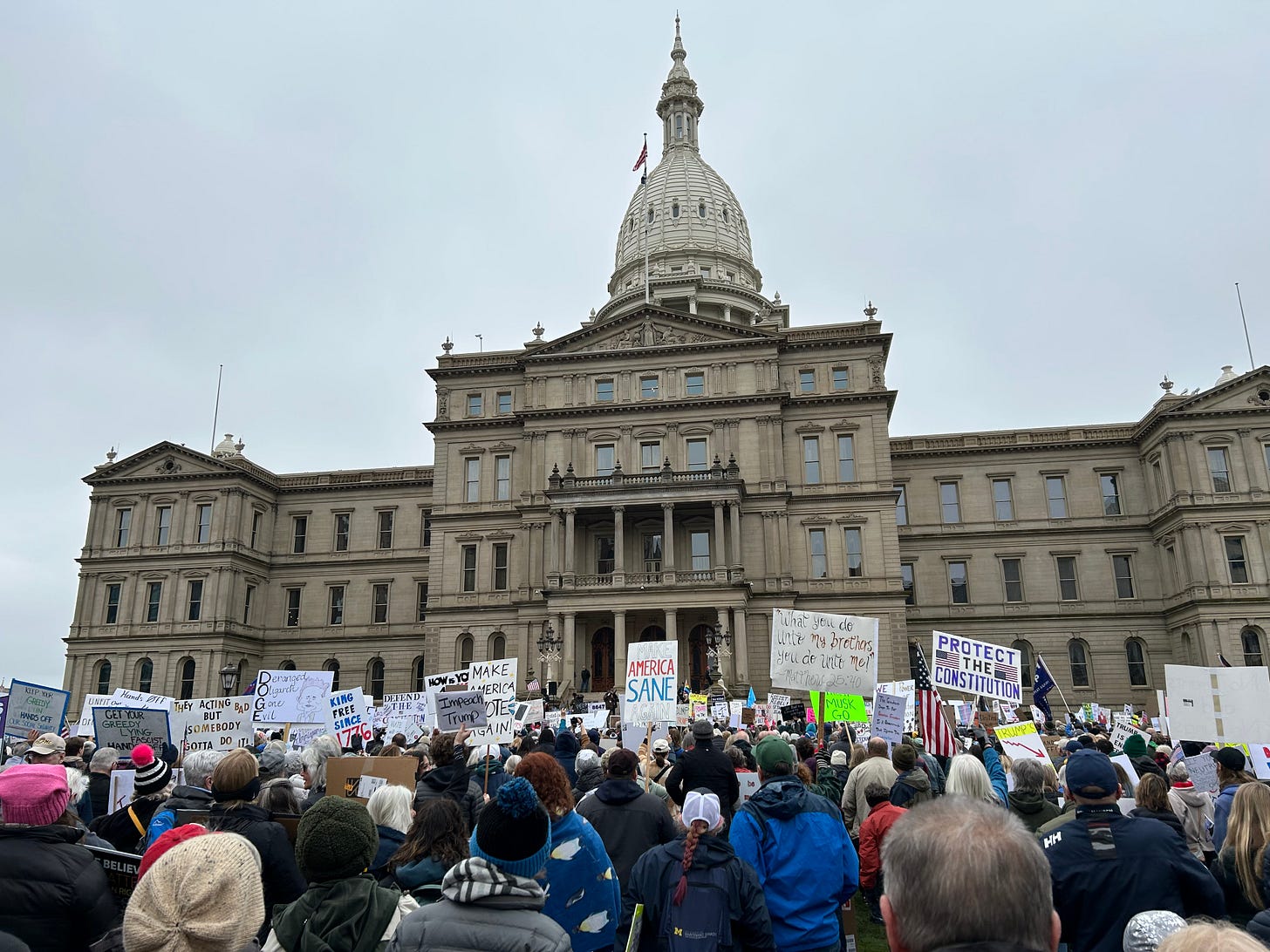
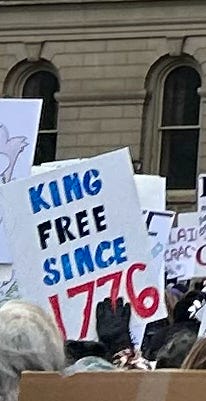
Fellow Bicentennial here. Absolutely nailed it with this post, Mike—past, present, and (hopeful) future.